
Sofort lieferbar (Download)
This book gathers a collection of essays presented from the perspective of a spatial planner whose working life has been immersed in South Asia. It concerns some of the serious challenges that need to be confronted in the South Asian context, including the externalities and ethical concerns that arise in the process of development. The mid-20th century saw a considerable focus in the West on assisting those countries emerging from European colonial domination. Theories were propounded and international agencies established to facilitate a process called 'development' in these countries. However, even after six decades of extraordinary expenditures and effort, millions among the targeted populations remain illiterate, live in abject poverty, and are the most vulnerable groups to external disasters, debilitating diseases and untimely death. In addition, the book reveals the theoretical inadequacies that negatively impact ongoing development efforts. Lastly, it identifies an available alternative set of science-based approaches that could facilitate the serious pursuit of equitable progress in South Asia and potentially also in other low and middle income countries.
Inhaltsverzeichnis
Part 1: Basic Concerns.-
Chapter 1. Development: the Concept.- Chapter 2. Sustainable Development.- Chapter 3. Science, Ethics and Development.- Chapter 4. Climate Change: the Facts.-
Part 2: Spatial Concerns.-
Chapter 5. Managing Climate Change.- Chapter 6. Managing Urbanization.- Chapter 7. Urban Primacy.- Chapter 8. Conserving Cultural Heritage Sites.- Chapter 9. A National Spatial Policy.-
Part 3: Conclusions.-
Chapter 10 Summary of Conclusions.-Chapter 11. Sustainable Development.
Produktdetails
Erscheinungsdatum
02. Juni 2018
Sprache
englisch
Auflage
1st ed. 2018
Seitenanzahl
167
Dateigröße
5,26 MB
Reihe
South Asia Economic and Policy Studies
Autor/Autorin
K. Locana Gunaratna
Verlag/Hersteller
Kopierschutz
mit Wasserzeichen versehen
Produktart
EBOOK
Dateiformat
PDF
ISBN
9789811089237
Entdecken Sie mehr
Bewertungen
0 Bewertungen
Es wurden noch keine Bewertungen abgegeben. Schreiben Sie die erste Bewertung zu "Towards Equitable Progress" und helfen Sie damit anderen bei der Kaufentscheidung.









